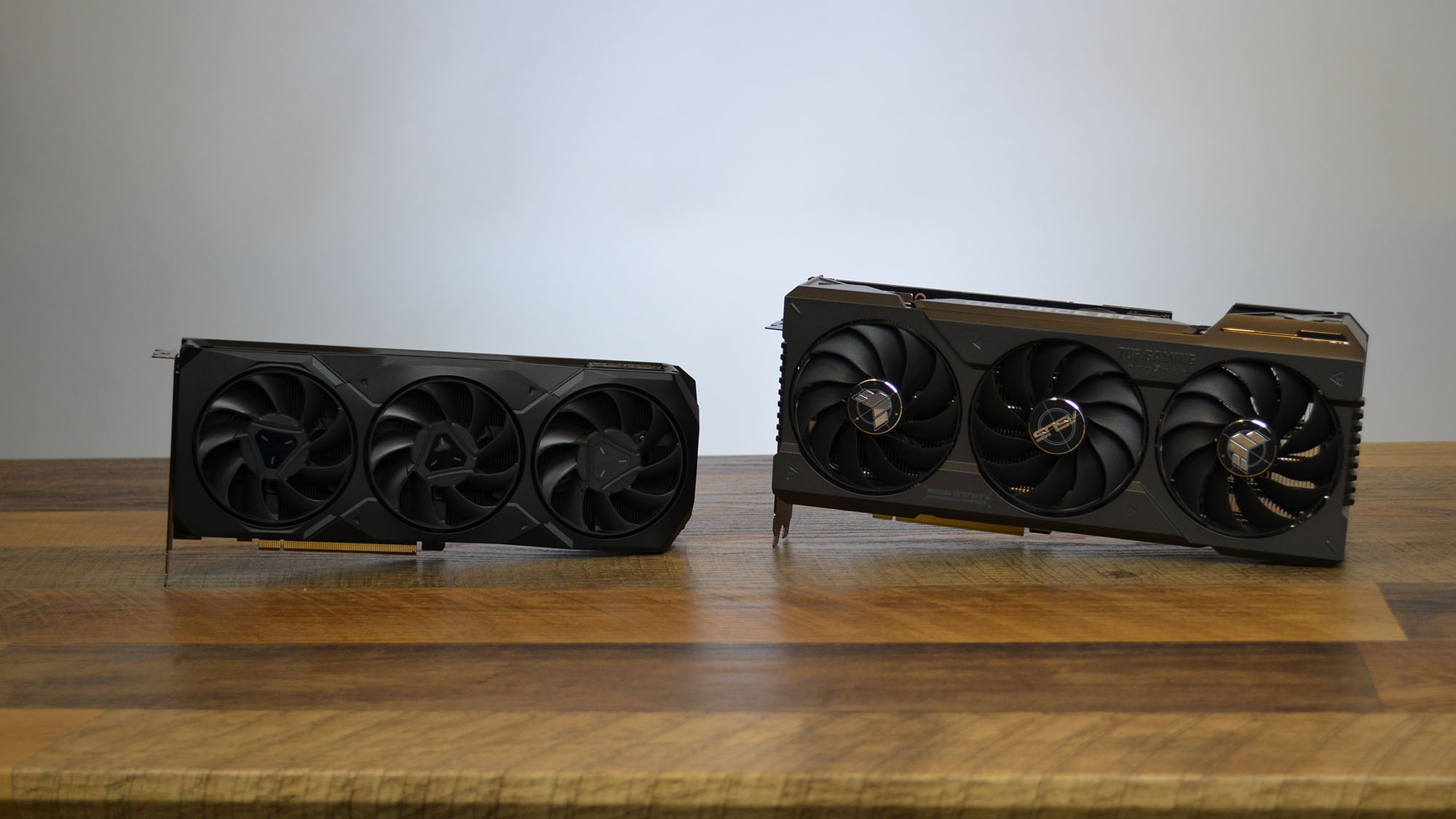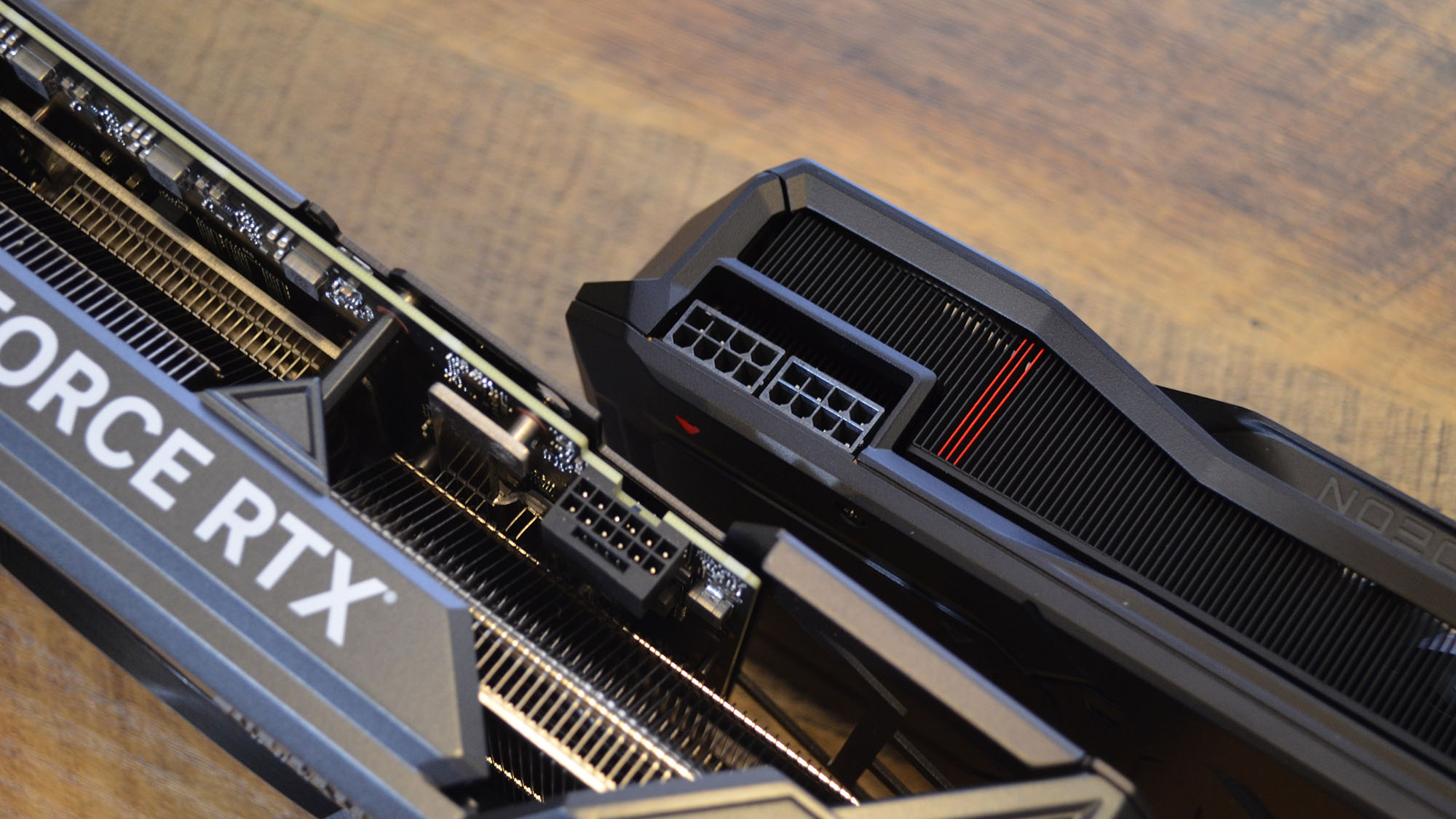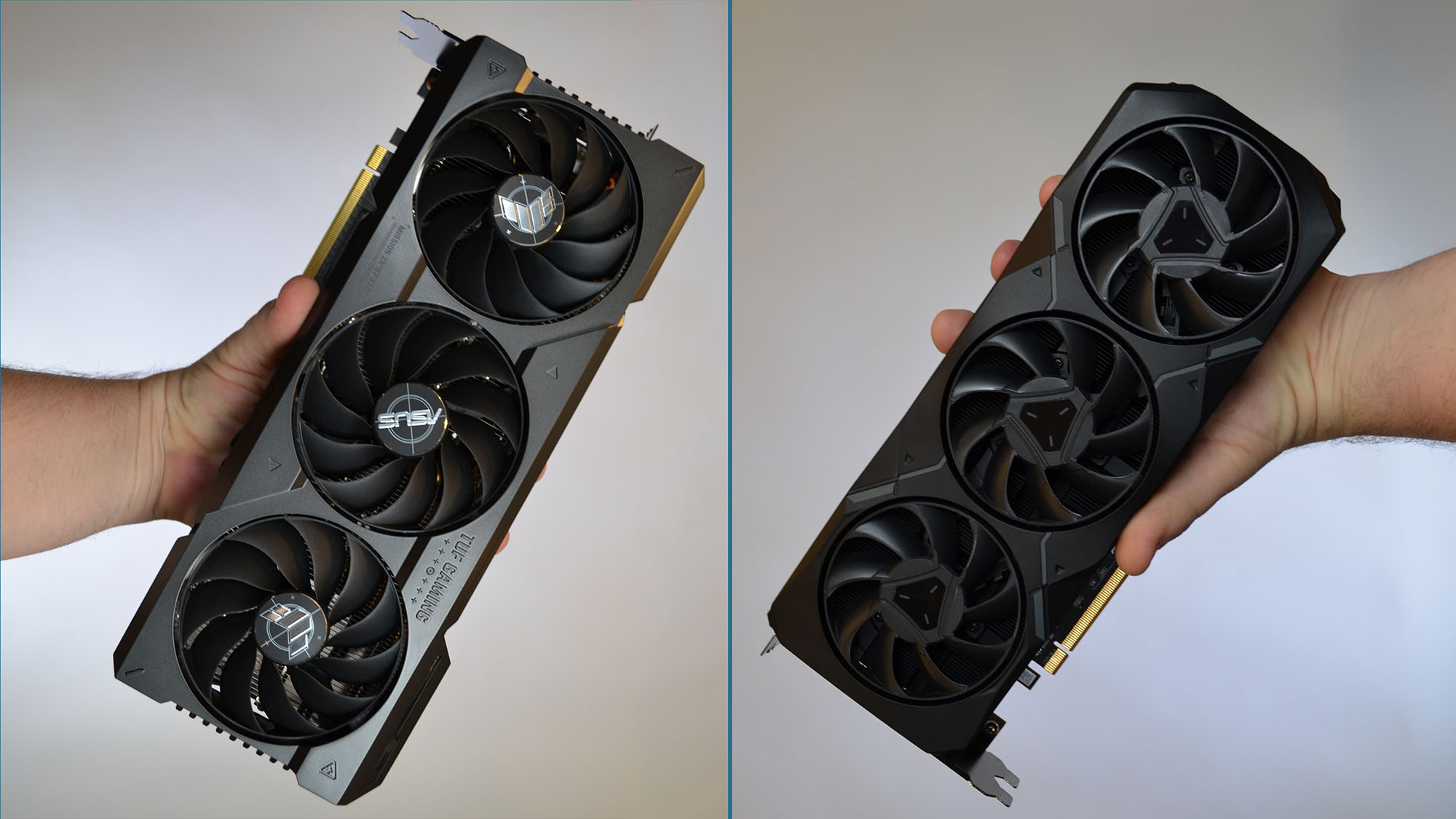Nvidia RTX 4070 Ti vs AMD RX 7900 XT: the best card for gamers might surprise you
AMD and Nvidia's latest 'gamer' cards go toe to toe

With the release of the Nvidia RTX 4070 Ti, the battle between Teams Red and Green is now joined in the more "affordable" segment of gaming graphics cards, and gamers have two great options to choose from in the Nvidia RTX 4070 Ti and AMD RX 7900 XT.
Both cards provide outstanding gaming performance, and their price points can be truly said to be under $1,000 / £1,000, rather than just a penny less than a grand as is the case with the AMD RX 7900 XTX. Nvidia, meanwhile, listed its first two next-gen cards — the RTX 4090 and RTX 4080 — well above a grand when they launched in late 2022.
Needless to say, graphics card prices have been wildly inflated in recent years. As such, the RTX 4070 Ti and RX 7900 XT are bound to get a lot of attention from consumers thanks to their excellent levels of performance and a price that I'd say is at least approaching accessible for most of us.
And now that I've extensively tested both the RTX 4070 Ti and the RX 7900 XT, I'm here to tell you that this is going to be a tougher choice than a lot of people might realize. Both cards are very well matched against each other, so I don't blame you if you're having some trouble choosing between them.
Fortunately, I'm here to drop the results of days of testing to help you find the best graphics card for your needs and budget, whether its gaming performance, creative performance, or just which one is a better value for your hard earned dollar.
Nvidia RTX 4070 Ti vs RX 7900 XT: Price

When it comes to the price of these two cards, it's not as cut and dried as looking at their MSRPs.
All of the best graphics cards are going to be manufactured by multiple board partners, so you're going to have two to three variants per GPU per manufacturer, featuring different heating solutions, different boost clock speeds, and other at-the-margins alterations to the base GPU inside.
This generally means that third-party cards are more expensive than the reference version released by either AMD or Nvidia when the card launches. These cards are important for a few reasons but the most important is that this is the only card guaranteed to be sold by AMD or Nvidia at their declared MSRP. Whether you can find it online is another matter, and both chipmakers are free to change their MSRPs at any time, but it's a very important guidepost to follow when talking price.
Unfortunately, Nvidia isn't releasing an RTX 4070 Ti reference card, which Nvidia calls the Founders Edition. That means that even though the RTX 4070 Ti has an MSRP of $799 in the US, whether you can actually find a card at that price is a much harder task.
AMD, meanwhile, has produced its own reference card for the Radeon RX 7900 XT, which means that no matter how much third-party manufacturers like XFX and Gigabyte charge for their variants on the RX 7900 XT GPU, there will always be at least one graphics card that is selling at MSRP. That MSRP might be $100 higher than the RTX 4070 Ti MSRP, but it's competitive against all of the third-party cards that have a comparable MSRP to the RX 7900 XT.
Still, you can find variants of the RTX 4070 Ti that sell for $799, even if they are in the minority, so by a narrow margin we do have to call this one for the Nvidia RTX 4070 Ti.
- Winner: Nvidia RTX 4070 Ti
Nvidia RTX 4070 Ti vs RX 7900 XT: Design

There is a lot about the AMD Radeon RX 7900 XT that sets it apart from the RTX 4070 Ti, going even beyond the fact that there is a reference card from AMD but none from Nvidia.
When it comes to third-party cards, the designs of the cards are going to depend on that manufacturer's specific branding, so there's not much to say about them. One thing of note though about the reference card for the AMD RX 7900 XT is that it is noticeably smaller than the typical RTX 4070 Ti, like the Asus Tuf Gaming version we received for testing.


Beyond that, the major difference between the two cards is the 12VHPWR power input on the RTX 4070 Ti, whereas the RX 7900 XT used dual 8-pin connectors that are the standard for all power supply manufacturers.
In the case of the former, there have been some concerns about the connectors on the 12VHPWR resulting in damage to the graphics card, but these appear to be limited to the RTX 4090, since we have not heard any reports so far of similar issues with the RTX 4080.
The issue could also have been simple user error, with the official explanation from Nvidia being that the connectors were not fully seated into the card, resulting in a bad connection with the pins. The long and short of this being to make sure you hear a click when putting any power connector into your graphics card to ensure that the connector is properly and fully connected.
Still, the addition of an adapter cable to feed three 8-pin connectors into a single 12VHPWR connector to use the Nvidia RTX 4070 Ti is still going to challenge your cable management skills. If you have a newer PSU that comes with 12VHPWR cables that feed right into the power supply, this will be much less of an issue, and might even make cable management easier.
If you don't have a new PSU, however, the AMD RX 7900 XT is simply going to be easier and more straightforward to work with. Between the smaller size of the reference card and the need for only two cables rather than three-to-one for the RTX 4070 Ti, the RX 7900 XT is going to be much easier to work with inside your case, especially if space is limited. If you already have a new power supply with a 12VHPWR cable included, your cable management is going to be easier, but you've still got a bigger card to work with, so there is a trade off there.
- Winner: AMD RX 7900 XT
Nvidia RTX 4070 Ti vs RX 7900 XT: Performance

Performance-wise, there isn't a whole lot of difference between the two cards in the aggregate, though Nvidia's RTX 4070 Ti is much stronger in ray tracing performance while AMD's RX 7900 XT is stronger in rasterization performance.
| BENCHMARK | NVIDIA RTX 4070 TI | AMD RX 7900 XT | DIFFERENCE |
|---|---|---|---|
| 3DMark Speedway | 5,437 | 5,077 | -6.62% |
| 3DMark Port Royal | 14,145 | 13,644 | -3.54% |
| 3DMark Timespy Extreme | 9,566 | 10,335 | 8.03% |
| 3DMark Timespy | 19,894 | 21,239 | 6.76% |
| 3DMark Firestrike Ultra | 13,669 | 16,333 | 19.49% |
| 3DMark Firestrike Extreme | 25,347 | 28,935 | 14.15% |
| Row 6 - Cell 0 | Row 6 - Cell 1 | Row 6 - Cell 2 | Row 6 - Cell 3 |
| Average performance | 14,676 | 15,927 | 8.52% |
In synthetic benchmarks, the Nvidia RTX 4070 Ti does a better job with the ray-tracing-heavy 3DMark Speedway and 3DMark Port Royal, but for Timespy and Firestrike (even at 4K), the RX 7900 XT really pulls away. This puts the RX 7900 XT about 8.5% faster than the RTX 4070 Ti.
| BENCHMARK | NVIDIA RTX 4070 TI | AMD RX 7900 XT | DIFFERENCE |
|---|---|---|---|
| Blender 3.4.0 Monster | 3,715 | 1,567 | -57.82% |
| Blender 3.4.0 Junkshop | 1,665 | 814 | -51.11 |
| Blender 3.4.0 Classroom | 1,848 | 737 | -60.12 |
| PugetBench for Premiere Pro | 845 | 719 | -14.91 |
| PugetBench for Photoshop | 1,007 | 1,023 | 1.59 |
| HandBrake (4K to 1080p, FPS) | 57 | 56 | -1.75 |
| Row 6 - Cell 0 | Row 6 - Cell 1 | Row 6 - Cell 2 | Row 6 - Cell 3 |
| Average Performance | 1,816 | 972 | -46.48 |
In terms of creative content workloads, Nvidia still really maintains its advantage here. It absolutely blows away the RX 7900 XT in Blender's benchmark, but it has the advantage here of Blender Cycles — the workload that these benchmarks test — being optimized for Nvidia's CUDA instruction set. AMD doesn't use CUDA, but it has said that it is working with Blender to optimize the forthcoming Blender 3.5.0 for AMD cards, so this disadvantage might not be as stark in the months ahead.
When it comes to video editing, you get about 15% better performance in Adobe Premiere with the Nvidia RTX 4070 Ti, though AMD does slightly better with the rasterization-leaning Adobe Photoshop. The difference with handbrake is very slight, though, with the RX 7900 XT scoring 56 frames per second to the RTX 4070 Ti's 57. This is more of a CPU-dependent workload though, so both cards only supplement the CPU rather than doing the bulk of the work.
Ultimately though, the RTX 4070 Ti is simply the better graphics cards for creatives at this point.
| BENCHMARK | NVIDIA RTX 4070 TI | AMD RX 7900 XT | DIFFERENCE |
|---|---|---|---|
| Metro Exodus (No RT) | `79 | 86 | 8.96% |
| Metro Exodus (Ultra RT) | 50 | 40 | -20.19% |
| F1 2022 Dubai (Wet) (Min RT) | 140 | 167 | 19.29% |
| F1 2022 Dubai (Wet) (Max RT) | 54 | 54 | 0.00% |
| Total War: Warhammer III | 53 | 59 | 11.32% |
| Cyberpunk 2077 (No RT) | 50 | 35 | -30.43% |
| Cyberpunk 2077 (Psycho RT) | 22 | 15 | -31.82% |
| Dirt 5 (RTX off) | 109 | 129 | 18.35% |
| Dirt 5 (RTX on) | 94 | 104 | 10.64% |
| Hitman 3 Dubai (No RT) | 135 | 160 | 18.52% |
| Hitman 3 Dubai (Max RT) | 36 | 30 | -16.67% |
| Tiny Tina's Wonderland | 104 | 105 | 0.96% |
| Shadow of the Tomb Raider | 50 | 46 | -8.00% |
| Row 13 - Cell 0 | Row 13 - Cell 1 | Row 13 - Cell 2 | Row 13 - Cell 3 |
| Average performance | 74 | 77 | 4.95% |
These cards are much more geared towards gamers than professionals, so we tested both on a range of games with both ray tracing options and without to get the best overall view of the cards' gaming prowess. In this case, both cards are capable of tackling 4K gaming pretty handily, and can easily get over 60 fps without ray tracing with some minor settings tweaks.
As was the case in the synthetic benchmarks, the Nvidia RTX 4070 Ti's greatest strength here is in ray tracing performance, which isn't a surprise. The 4070 Ti has third-generation RT cores, while the RX 7900 XT is only on its second-generation ray accelerators. Still, the ray tracing performance of the RX 7900 XT is still light-years ahead of the RX 6900 XT's.
Without ray tracing though, the RX 7900 XT generally outperforms the RTX 4070 Ti, and sometimes by a wide margin. In most cases, neither card is going to get great ray-tracing performance (at least not without DLSS/FSR), and most games don't even have ray tracing as an option, so the chances are that the RX 7900 XT is just going to be better for most games out there.
This is especially true if you're gaming at 1440p or lower. All of our tests were at 4K, but the RX 7900 XT has 8GB more VRAM than the RTX 4070 Ti, and even though the RTX 4070 Ti has faster memory, the RX 7900 XT still has a much larger 320-bit bus compared to the RTX 4070 Ti's 192-bit bus.
This, plus the much larger VRAM pool, gives the RX 7900 XT a clear advantage when it comes to smaller texture files used at 1440p and 1080p, which is reflected in the RX 7900 XT's superior performance in 3DMark Timespy and 3DMark Firestrike, both of which are 1080p benchmarks. It also means that much larger texture files are also going to be easier to handle since there is considerably more room in memory for a file size double that of a 4K texture, which presents a bottleneck for the RTX 4070 Ti.
Add in the RX 7900 XT's DisplayPort 2.1 output, as opposed to the RTX 4070 Ti's DisplayPort 1.4, and it's a graphics card much better positioned for 8K gaming in the next few years in a way that the Nvidia RTX 4070 Ti simply can never be.
The RTX 4070 Ti will always be capped at 60Hz for 8K video, while the RX 7900 XT will be capable of 165Hz for 8K video. This alone puts it ahead of the RTX 4070 Ti since that means there are simply things the RX 7900 XT can do that the RTX 4070 Ti can't, and those things aren't that far off in the future.
Finally, there have been some long standing concerns about AMD's driver support for its cards, which aren't updated as often as Nvidia's so some games or apps might not run as well on the RX 7900 XT when they are first released. But we didn't encounter any issues with drivers during our testing on either card, so both look like they are very stable across the board.
| CATEGORY | NVIDIA RTX 4070 TI | AMD RX 7900 XT | DIFFERENCE |
|---|---|---|---|
| Synthetic Benchmarks | 14,676 | 15,927 | 8.52% |
| Creative Benchmarks | 1,816 | 972 | -46.78% |
| Gaming Benchmarks | 74 | 77 | 4.95% |
| Final Performance Average | 5,522 | 5,658 | 2.61% |
| Final Points Per MSRP Dollar | 6.911 | 6.294 | -8.93% |
Ultimately, the RX 7900 XT does eek out a win on the scoreboard overall, and its gaming performance is often better than the RTX 4070 Ti, but the difference at 4K isn't all that much in the end.
What's more, when factoring in the MSRP for these cards, the RTX 4070 Ti offers a much better value at the moment, as well as DLSS 3 which can greatly improve frame rates on games. AMD has FSR and RSR, but the DLSS is still the better upscaling tech overall.
Still, the RX 7900 XT is no slouch when it comes to 4K, and is better able to handle sub-4K and 8K content than the RTX 4070 Ti, so while the RTX 4070 Ti does one this exceptionally well (4K ray tracing and upscaling), the RX 7900 XT can do those thing too, while also offering better performance in a year or two at 8K. No, you won't be getting 165 fps on Cyberpunk 2077 in 8K, but Cult of the Lamb? Overwatch 2?
In games like that (if not those games specifically), you'll definitely be able to get some obscene framerates at 8K with the right settings. While the RTX 4070 Ti could hit those frame rates too, you'll never see them thanks to DP 1.4, and so the utility of the RTX 4070 Ti is much more limited to 4K. For this alone, we have to go with the RX 7900 XT.
- Winner: AMD RX 7900 XT
Which one should you buy?

To be honest, both of these cards absolutely rock if you're only looking for 4K gaming performance. If you never use ray tracing in your games and or you plan to move on to 8K content, then the RX 7900 XT is definitely the better bet. If ray tracing specifically is your biggest concern, you'll definitely want to go for the RTX 4070 Ti, as you should if you're looking for a creative content graphics card on a "budget".
Get daily insight, inspiration and deals in your inbox
Sign up for breaking news, reviews, opinion, top tech deals, and more.

John (He/Him) is the Components Editor here at TechRadar and he is also a programmer, gamer, activist, and Brooklyn College alum currently living in Brooklyn, NY.
Named by the CTA as a CES 2020 Media Trailblazer for his science and technology reporting, John specializes in all areas of computer science, including industry news, hardware reviews, PC gaming, as well as general science writing and the social impact of the tech industry.
You can find him online on Bluesky @johnloeffler.bsky.social